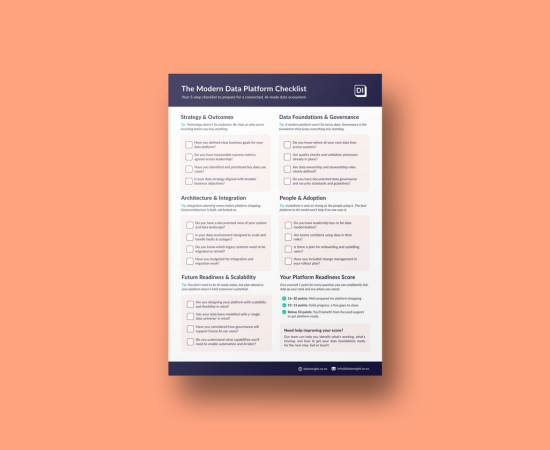Managing analytics projects can be a lot like planning a trip.
You need a clear destination, a well-thought-out itinerary, and you have a group of stakeholders to keep happy along the way. In this blog, we'll embark on a journey through stakeholder management for analytics and insights teams. So, grab your sunnies and sandals and let's get started!
Sell the Dream, Explain the Reality
Imagine you're planning a trip to an exotic island. It's crucial to excite your travel companions with the dream of pristine beaches and breathtaking sunsets.
However, you also need to explain the reality – flight costs, accommodation, and potential inconveniences. Can you drink the water? What’s the sanitation like? How bad are the bugs?
Similarly, in analytics, you must sell the vision of game-changing insights while managing expectations about data limitations and complexities as well as team capacity and capability.
Stakeholder management tip #1 :
Be a storyteller. Craft narratives that paint a compelling picture of what insights can achieve while being transparent about the data and team’s strengths and weaknesses.
Make Requirements Clear
When planning a trip, everyone has their preferences.
Some crave adventure, while others seek relaxation. Whatever you choose, you need the right gear and the right people involved. To avoid misunderstandings, you need to make your travel requirements crystal clear.
In analytics, it's no different. Clearly define what stakeholders need and expect from your team and what you need from them. Do they want monthly reports, real-time dashboards, or deep-dive analyses?
Stakeholder management tip #2 :
Use a collaborative approach. Regularly communicate with stakeholders to agree, refine, and align their requirements with your team's capabilities.
Justifying Outsourcing
Sometimes, planning a trip means outsourcing certain tasks.
Perhaps you hire a tour guide or a local expert to enhance your experience. In analytics, outsourcing can be hugely beneficial. It allows you to tap into specialised skills and experience, as well as expand your team’s capacity. However, justifying outsourcing can be a challenge.
If you have a lean team that’s at capacity keeping the lights on, then you’re not going to be moving the strategic initiatives forward. Make it clear that any discrepancy between the reality and requirements, and the demanded delivery, must be met through outside support such as contract analysts.
Stakeholder management tip #3 :
Highlight the advantages of outsourcing, such as cost-effectiveness, faster delivery, or access to niche expertise. Show stakeholders how it benefits the overall journey and the impact on the timeline of key strategic initiatives of not getting external support.
Maximising ROI vs. Minimising Cost?
Travelers often face the dilemma of choosing between maximising their trip's return on investment (ROI) or minimising costs.
Do you want to see all the sites, or do you want to immerse yourself in the local culture and environment?
Similarly, analytics teams must strike a balance. Do you invest heavily in advanced analytics tools, or do you focus on cost-efficient solutions?
Stakeholder management tip #4 :
Collaborate with stakeholders to establish the right balance. Prioritize projects that align with the organization's strategic goals and demonstrate a clear ROI.
Prioritisation
No trip can tick all the boxes.
You need to prioritise destinations, activities, and expenses.
Likewise, analytics teams face a never-ending list of potential projects. Prioritisation is key to managing stakeholders' expectations and delivering value.
Stakeholder management tip #5 :
Develop a prioritisation framework that considers factors like business impact, resource availability, and urgency. Keep this updated and check in with stakeholders regularly. This helps you tackle high-value projects first.
Getting the Foundations Right
Before you embark on your journey, it's essential to ensure your travel plans are built on a solid foundation – from visas to travel insurance.
While it’s not the fun stuff, it maximises your chances that things will go right, and that you’re OK when they don’t.
In analytics, getting the foundations right means having clean, reliable data, robust analytics tools, clear risk processes, well documented procedures, and a skilled team.
Stakeholder management tip #6:
Continuously invest in the foundations of your analytics practice. Regularly assess data quality, upgrade tools, and provide training to your team to ensure a smooth journey.
In conclusion, stakeholder management for analytics and insights teams is like planning a trip. You must sell the dream while explaining the reality, make requirements clear, justify outsourcing, balance ROI and cost, prioritise effectively, and build strong foundations.
Just as a well-planned trip can lead to unforgettable memories, effective stakeholder management can result in game-changing insights and a successful analytics journey.
So, pack your bags, and let's embark on this exciting adventure together!








.png)